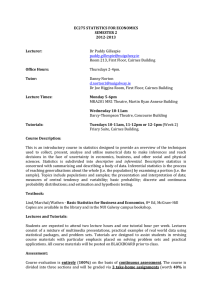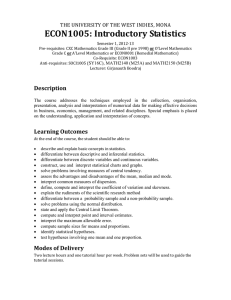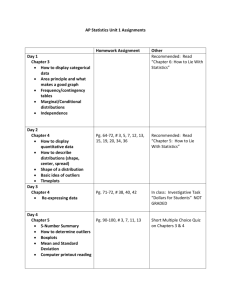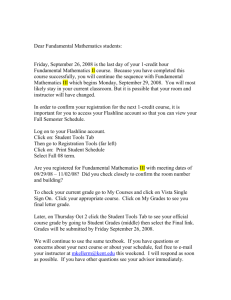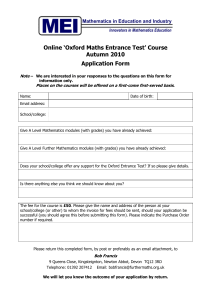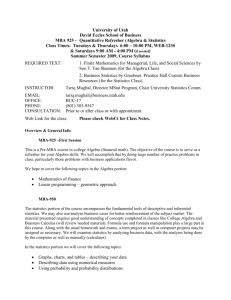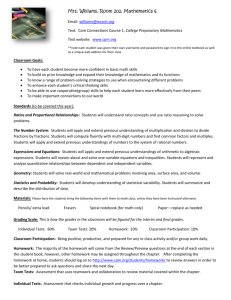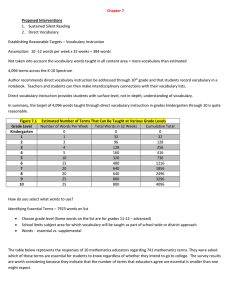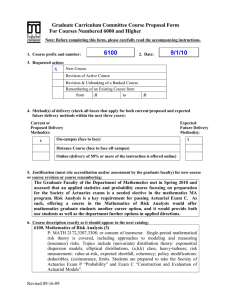AP Statistics Syllabus
advertisement
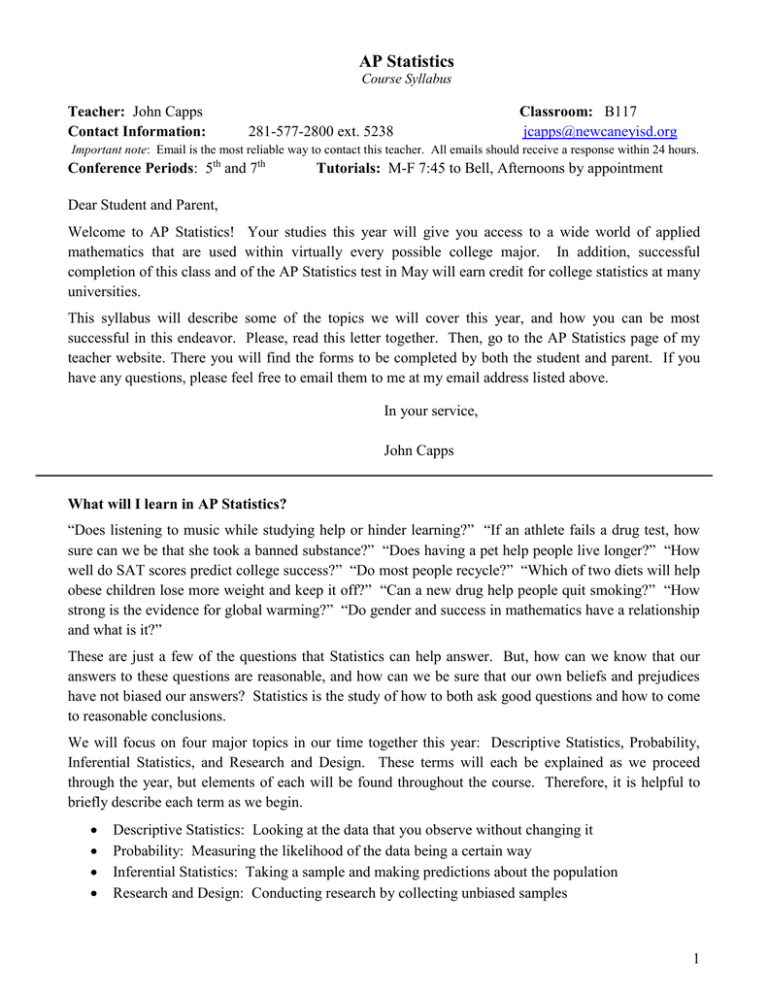
AP Statistics Course Syllabus Teacher: John Capps Contact Information: 281-577-2800 ext. 5238 Classroom: B117 jcapps@newcaneyisd.org Important note: Email is the most reliable way to contact this teacher. All emails should receive a response within 24 hours. Conference Periods: 5th and 7th Tutorials: M-F 7:45 to Bell, Afternoons by appointment Dear Student and Parent, Welcome to AP Statistics! Your studies this year will give you access to a wide world of applied mathematics that are used within virtually every possible college major. In addition, successful completion of this class and of the AP Statistics test in May will earn credit for college statistics at many universities. This syllabus will describe some of the topics we will cover this year, and how you can be most successful in this endeavor. Please, read this letter together. Then, go to the AP Statistics page of my teacher website. There you will find the forms to be completed by both the student and parent. If you have any questions, please feel free to email them to me at my email address listed above. In your service, John Capps What will I learn in AP Statistics? “Does listening to music while studying help or hinder learning?” “If an athlete fails a drug test, how sure can we be that she took a banned substance?” “Does having a pet help people live longer?” “How well do SAT scores predict college success?” “Do most people recycle?” “Which of two diets will help obese children lose more weight and keep it off?” “Can a new drug help people quit smoking?” “How strong is the evidence for global warming?” “Do gender and success in mathematics have a relationship and what is it?” These are just a few of the questions that Statistics can help answer. But, how can we know that our answers to these questions are reasonable, and how can we be sure that our own beliefs and prejudices have not biased our answers? Statistics is the study of how to both ask good questions and how to come to reasonable conclusions. We will focus on four major topics in our time together this year: Descriptive Statistics, Probability, Inferential Statistics, and Research and Design. These terms will each be explained as we proceed through the year, but elements of each will be found throughout the course. Therefore, it is helpful to briefly describe each term as we begin. Descriptive Statistics: Looking at the data that you observe without changing it Probability: Measuring the likelihood of the data being a certain way Inferential Statistics: Taking a sample and making predictions about the population Research and Design: Conducting research by collecting unbiased samples 1 What is the most important skill I will need for this class? This may surprise you, but AP Statistics will require very little mathematics. I feel that you can get a passing score on the AP test without knowing anything more than middle school math! (Nevertheless, the College Board recommends that students in Statistics should already have completed Algebra 2 or take in concurrently.) More than having great numeracy, you need to be able to read and write clearly. You will not be successful on ANY problem without explaining your thinking. Here is a good rule of thumb: For each answer you give to a problem, you need to write an explanation of your thinking that any typical eighth grader could read and understand. If you can do this, your success will be assured! What materials will I need? Each time you come to class you will need notebook paper (college or wide-ruled) a composition notebook for taking notes a three-ring binder for keeping your stuff plenty of sharp pencils with erasers What about a calculator? I will provide you with a TI-Inspire for use in class. You do not need to buy one, but you might consider it. It would be a good investment and you will eventually need one in college. If you have a specific calculator in mind, ask me about it before you buy it. You only need to make sure that it is one that is approved for your use on the AP test in May. How will my grade be determined? Major grades - These may include in-class tests and projects done partially outside of class. Daily grades - These will include the following: o Regular quizzes o Homework o Presentation grades o Various other in-class activities will also receive daily credit. Each nine-week average will count toward 45% of your semester grade. 10% of your semester average will come from a cumulative final exam. What did you say about homework? In order for you to be successful, it is necessary that you practice what you are learning. Therefore, you should expect to spend between thirty minutes and an hour per night on homework, on average. In order to receive credit for any problem in class or on a test, you will need to write a clear, written explanation of your thinking. Your explanation is worth 95% and your final numerical answer is worth only about 5%. Sometimes, if you give a wrong number answer this will be excused if you give a clear and correct reasoning and your error is only due to a simple, arithmetic mistake! 2 What do I do if I am absent? First of all, try to avoid this. Part of the learning in this class comes from class and group discussions, which are hard to make up. I do understand that sometimes, absences are unavoidable. When this happens I expect you to join me for tutorials (see times at the top of page one) so I can explain to you what was missed and how you can make it up. It is your responsibility to initiate this process. If you need to schedule a special time, either email me or set it up with me in person. If you know beforehand that you will be absent make sure you let me know. I might be able to give you an alternative assignment or other resource to help you so that you will not fall behind. What are the class rules? All of you are either already adults, or almost there! I will treat you accordingly. I expect you to treat each other and myself with respect and honesty. That being said I think you know how to avoid getting in trouble. Of course, we will follow all school policies (think tardy policy, cell-phones, dress code, etc.). If you have questions as to specific school policies, you may refer to the school’s Student Code of Conduct. I expect us to have a great time together! More specifics on what you will learn: Textbook: The Practice of Statistics, by Starnes, Yates, and Moore. 4th Edition, 2012. Order of Topics: (note: dates refer to when each subject will be tested and may change) Chapters 1 4 2 5 6 7 8 9 10 11 3 12 Unit of Study Designing Studies Exploring Data Designing Studies Modeling Distributions of Data Probability: What are the Chances? Random Variables Sampling Distributions Estimating with Confidence Testing a Claim Comparing Two Populations or Groups Inference for Distributions of Categorical Data Describing Relationships More about Regression Review for the AP Test Test Date Aug 26 Sept 10 Sept 24 Oct 12 Nov 3 Nov 19 Dec 16 Jan 22 Feb 5 Feb 22 Mar 9 Mar 31 Apr 4, 6, 8, 12, 14, 18, 20, 22, 26, 28 Thursday, May 12** **May 12th is the AP Statistics Test 3
